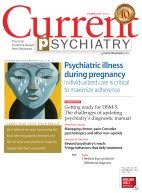Wednesday, December 2, 2009
Clozapine for schizophrenia: Life-threatening or life-saving treatment?
Leslie Citrome, MD, MPH, Professor of psychiatry, New York University School of Medicine, New York, NY, Director, Clinical Research and Evaluation Facility, Nathan S. Kline Institute for Psychiatric Research, Orangeburg, NY
Researchers in Finland surprised psychiatrists this year by announcing that clozapine “seems to be associated with a substantially lower mortality than any other antipsychotic.” This finding also surprised the researchers, who expected their 11-year study to link long-term use of second-generation (“atypical”) antipsychotics with increased mortality in patients with schizophrenia. Instead they found longer lives in patients who used antipsychotics (and particularly clozapine), compared with no antipsychotic use.
This study’s findings do not change clozapine’s association with potentially fatal agranulocytosis as well as weight gain, metabolic abnormalities, and other adverse effects. Clozapine also is difficult to administer, and patients must be enrolled in FDA-mandated registries. These obstacles might discourage you from offering clozapine to patients who could benefit from it.
Why bother considering clozapine? Because recent data on decreased mortality, decreased suicidality, and control of aggressive behavior make clozapine a compelling choice for many patients. Careful attention to clozapine’s adverse effect profile is necessary, but you can manage these risks with appropriate monitoring.
Read full text (free access)
Listen to Dr. Citrome discuss discusses how to determine if clozapine is an appropriate choice for your patient
Comment on this article
Email the editor
Late-life depression: Managing mood in patients with vascular disease
Helen Lavretsky, MD, MS, Associate professor of psychiatry, Semel Institute for Neuroscience and Human Behavior, David Geffen School of Medicine at UCLA, Los Angeles, CA
Thomas Meeks, MD, Assistant professor of psychiatry, Division of geriatric psychiatry, VA San Diego Healthcare System, Sam and Rose Stein Institute for Research on Aging, University of California, San Diego
Newly diagnosed major depressive disorder (MDD) in patients age ≥65 often has a vascular component. Concomitant cerebrovascular disease (CVD) does not substantially alter the management of late-life depression, but it may affect presenting symptoms, complicate the diagnosis, and influence treatment outcomes.
The relationship between depression and CVD progression remains to be fully explained, and no disease-specific interventions exist to address vascular depression’s pathophysiology. When planning treatment, however, one can draw inferences from existing studies. This article reviews the evidence on late-life depression accompanied by CVD and vascular risk factors, the “vascular depression” concept, and approaches to primary and secondary prevention and treatment.
Read full text (free access)
Comment on this article
Email the editor
Labels:
cerebrovascular disease,
CVD,
depression
Mindfulness interventions for depression and anxiety
Mark A. Lau, PhD, RPsych, Clinical associate professor, Department of psychiatry, University of British Columbia, Vancouver, BC, Canada
Andrea D. Grabovac, MD, FRCPC, Clinical assistant professor, Department of psychiatry, University of British Columbia, Vancouver, BC, Canada
Mindfulness-based cognitive therapy (MBCT) was originally developed to help prevent depressive relapse. MBCT also can reduce depression and anxiety symptoms. More recently, MBCT was shown to help individuals discontinue antidepressants after recovering from depression. Regular mindfulness meditation has been shown to result in structural brain changes that may help explain how the practice effectively addresses psychiatric symptoms. With appropriate training, psychiatrists can help patients reap the benefits of this cognitive treatment.
Read full text (free access)
Comment on this article
Email the editor
Labels:
anxiety,
cognitive-behavioral therapy,
depression,
mindfulness
Are psychiatrists more evidence-based than psychologists?

Henry A. Nasrallah, MD
Editor-in-Chief
A recent psychology journal article lambasted clinical psychologists for not using evidence-based psychotherapeutic modalities when treating their patients. The authors pointed out that many psychologists were ignoring efficacious and cost-effective psychotherapy interventions or using approaches that lack sufficient evidence.
An accompanying editorial was equally scathing—calling the disconnect between clinical psychology practice and advances in psychological science “an unconscionable embarrassment”—and warned that the profession “will increasingly discredit and marginalize itself” if it persists in neglecting evidence-based practices. The author quoted the respected late psychologist Paul Meehl as saying “most clinical psychologists select their methods like kids make choices in a candy store” and added that the comment is heart-breaking because it is true. A Newsweek column—“Ignoring the evidence: Why do psychologists reject science?”—elicited little agreement and mostly howls of protest from psychologists.
So, are psychiatrists more evidence-based than psychologists?
Read full text (free access)
Comment on this article
Email the editor
Subscribe to:
Comments (Atom)

